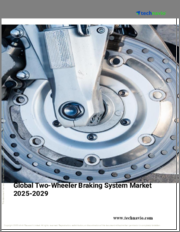
|
시장보고서
상품코드
1639295
이륜차용 브레이크 시스템 시장 : 기회, 성장 촉진요인, 산업 동향 분석, 예측(2025-2034년)Two-wheeler Braking System Market Opportunity, Growth Drivers, Industry Trend Analysis, and Forecast 2025 to 2034 |
||||||
세계의 이륜차용 브레이크 시스템 시장 규모는 2024년에 44억 달러로 평가되었고, 2025년부터 2034년까지 연평균 복합 성장률(CAGR) 6.5%를 나타낼 것으로 예측됩니다.
시장의 성장은 주로 사고나 사망자의 감소를 목표로 하는 엄격한 안전규제의 시행에 의해 초래됩니다. 현재 세계 규제기관은 일정한 엔진 용량 이상의 이륜차에 대해 안티록 브레이크 시스템(ABS)이나 콤비 브레이크 시스템(CBS)과 같은 고급 브레이크 시스템의 장착을 의무화하고 있습니다. 이러한 조치는 특히 긴급 상황이나 과제가 많은 노면에서의 브레이크 효율과 안정성을 높이기 위한 것입니다.
첨단 브레이크 기술의 채용이 증가하고 있는 것은 이러한 규제 요건에 대응하기 위해서, 시장의 확대를 뒷받침하고 있습니다. 제조업체는 이러한 시스템을 대중용 오토바이에 비용 효율적으로 통합하기 위한 연구개발에 주력하고 있어, 접근성의 폭을 넓히고 있습니다. 게다가 아시아태평양에서의 이륜차 수요 증가는 라스트 마일 딜리버리 서비스의 인기 증가에 힘입어 생산 대수, 나아가서는 브레이크 시스템 수요를 밀어 올리고 있습니다.
추진과 관련하여 시장은 내연 기관차(ICE)와 전기자동차(EV)로 분류됩니다. ICE 이륜차는 2024년 76%의 점유율을 차지하며 2034년까지 35억 달러를 창출할 것으로 예상됩니다. 내연 기관차는 확립된 제조거점, 합리적인 가격, 광범위한 연료 인프라로 우위를 차지하고 있습니다. 비용 효과가 높기 때문에 특히 아시아태평양과 같은 가격에 민감한 시장에서 특히 매력적입니다.
| 시장 범위 | |
|---|---|
| 시작 연도 | 2024년 |
| 예측 연도 | 2025-2034년 |
| 시작 금액 | 44억 달러 |
| 예측 금액 | 82억 달러 |
| CAGR | 6.5% |
시장은 또한 판매 채널별로 주문자 상표 부착 생산(OEM) 및 애프터마켓으로 구분됩니다. 2024년에는 OEM이 85%의 점유율을 차지하며 생산 시 브레이크 시스템을 원활하게 통합할 수 있는 능력을 활용했습니다. 설계, 개발 및 조립의 각 프로세스를 관리함으로써 첨단 기술을 확실하게 통합하고 제품의 품질과 성능을 향상시킵니다.
인도의 이륜차 브레이크 시스템 시장은 2024년에 35%의 점유율을 차지했으며, 2034년까지 15억 달러를 창출할 것으로 예측됩니다. 이 성장은 인구밀집지에서 저렴한 운송 솔루션에 대한 높은 수요가 원동력이 되고 있습니다. 이 지역의 견고한 생산 능력과 광범위한 공급망은 시장 성장을 더욱 강화하고 있습니다. 게다가 도시화의 진전과 교통 정체의 악화가 모터사이클이나 스쿠터의 보급을 가속시켜, 효과적인 브레이크 시스템의 필요성을 부추기고 있습니다.
목차
제1장 조사 방법 및 조사 범위
제2장 주요 요약
제3장 업계 인사이트
- 생태계 분석
- 공급자의 상황
- OEM 이륜차용 브레이크 시스템 제조업체
- 애프터마켓 프로바이더
- 판매자
- 최종 사용자
- 이익률 분석
- 가격 분석
- 코스트 내역
- 기술 및 혁신의 전망
- 주요 뉴스 및 대처
- 규제 상황
- 영향요인
- 성장 촉진요인
- 자동차 안전 규제 및 기준에 대한 주목의 고조
- 고급 모터 사이클과 스쿠터에 대한 수요 증가
- 스쿠터 보급을 촉진하는 도시화 및 교통 정체 증가
- ABS나 회생 브레이크 등의 브레이크 기술의 진보
- 업계의 잠재적 위험 및 과제
- 높은 첨단 브레이크 시스템 비용 및 저소득층 시장에서의 구매 가능성에 영향
- 인지도와 인프라의 부족에 의해 개발 도상 지역에서의 선진 브레이크 시스템의 보급이 한정적
- 성장 촉진요인
- 성장 가능성 분석
- Porter's Five Forces 분석
- PESTEL 분석
제4장 경쟁 구도
- 서문
- 기업 점유율 분석
- 경쟁 포지셔닝 매트릭스
- 전략 전망 매트릭스
제5장 시장 추계 및 예측 : 유형별(2021-2034년)
- 주요 동향
- 디스크 브레이크
- 드럼 브레이크
- 복합 브레이크 시스템(CBS)
- 안티록 브레이크 시스템(ABS)
제6장 시장 추계 및 예측 : 추진별(2021-2034년)
- 주요 동향
- ICE
- 커뮤터 모터 사이클
- 크루저 모터사이클
- 스포츠 오토바이
- 스쿠터와 모펫
- 전기자동차
제7장 시장 추계 및 예측 : 판매 채널별(2021-2032년)
- 주요 동향
- OEM(상대처 브랜드 제조)
- 애프터마켓
제8장 시장 추계 및 예측 : 지역별(2021-2034년)
- 주요 동향
- 북미
- 미국
- 캐나다
- 유럽
- 영국
- 독일
- 프랑스
- 스페인
- 이탈리아
- 러시아
- 북유럽
- 아시아태평양
- 중국
- 인도
- 일본
- 한국
- 뉴질랜드
- 동남아시아
- 라틴아메리카
- 브라질
- 멕시코
- 아르헨티나
- 중동 및 아프리카
- UAE
- 남아프리카
- 사우디아라비아
제9장 기업 프로파일
- Advics
- AJP Braking Systems
- Akebono Brake Industry
- Alcon Components
- Bosch
- Brakes India
- Brembo SpA
- Continental AG
- EBC Brakes
- Endurance Technologies
- Ferodo
- Galfer Brakes
- HEL Performance
- Honda Motor
- Hitachi Astemo
- RCB(Racing Boy)
- TVS Motor Company
- Wabco Holdings Inc.
- Yutaka Giken
- ZF Friedrichshafen
The Global Two-Wheeler Braking System Market was valued at USD 4.4 billion in 2024 and is anticipated to grow at a CAGR of 6.5% from 2025 to 2034. The market's growth is primarily driven by the enforcement of stringent safety regulations aimed at reducing accidents and fatalities. Regulatory bodies worldwide now mandate advanced braking systems like Anti-lock Braking Systems (ABS) or Combi-Braking Systems (CBS) for two-wheelers above certain engine capacities. These measures aim to enhance braking efficiency and stability, particularly under emergency conditions or on challenging road surfaces.
The increasing adoption of advanced braking technologies responds to these regulatory requirements, bolstering market expansion. Manufacturers are focusing on research and development to integrate these systems cost-effectively into mass-market two-wheelers, thereby broadening accessibility. Additionally, the rising demand for two-wheelers in Asia-Pacific, fueled by the growing popularity of last-mile delivery services, is driving production and, consequently, the demand for braking systems.
In terms of propulsion, the market is categorized into internal combustion engine (ICE) and electric vehicles (EVs). ICE two-wheelers held 76% share in 2024 and are expected to generate USD 3.5 billion by 2034. ICE vehicles dominate due to their well-established manufacturing base, affordability, and widespread fuel infrastructure. Their cost-effectiveness makes them particularly appealing in price-sensitive markets, especially in regions like Asia-Pacific.
| Market Scope | |
|---|---|
| Start Year | 2024 |
| Forecast Year | 2025-2034 |
| Start Value | $4.4 Billion |
| Forecast Value | $8.2 Billion |
| CAGR | 6.5% |
The market is also segmented by sales channels into original equipment manufacturers (OEMs) and aftermarket. In 2024, OEMs held 85% share, leveraging their ability to seamlessly integrate braking systems during production. Their control over design, development, and assembly processes ensures the incorporation of advanced technologies, enhancing product quality and performance.
India two-wheeler braking system market accounted for 35% share in 2024 and is projected to generate USD 1.5 billion by 2034. This growth is driven by the high demand for affordable transportation solutions in densely populated areas. Robust production capabilities and extensive supply chains in the region further support market growth. Additionally, increasing urbanization and worsening traffic congestion have heightened the adoption of motorcycles and scooters, fueling the need for effective braking systems.
Table of Contents
Chapter 1 Methodology & Scope
- 1.1 Research design
- 1.1.1 Research approach
- 1.1.2 Data collection methods
- 1.2 Base estimates and calculations
- 1.2.1 Base year calculation
- 1.2.2 Key trends for market estimates
- 1.3 Forecast model
- 1.4 Primary research & validation
- 1.4.1 Primary sources
- 1.4.2 Data mining sources
- 1.5 Market definitions
Chapter 2 Executive Summary
- 2.1 Industry 360° synopsis, 2021 - 2034
Chapter 3 Industry Insights
- 3.1 Industry ecosystem analysis
- 3.2 Supplier landscape
- 3.2.1 OEM Two-wheeler braking system manufacturers
- 3.2.2 Aftermarket providers
- 3.2.3 Distributors
- 3.2.4 End users
- 3.3 Profit margin analysis
- 3.4 Pricing analysis
- 3.5 Cost breakdown
- 3.6 Technology & innovation landscape
- 3.7 Key news & initiatives
- 3.8 Regulatory landscape
- 3.9 Impact forces
- 3.9.1 Growth drivers
- 3.9.1.1 Rising focus on vehicle safety regulations and standards
- 3.9.1.2 Growing demand for premium motorcycles and scooters
- 3.9.1.3 Increasing urbanization and traffic congestion driving scooter adoption
- 3.9.1.4 Advancements in braking technologies like ABS and regenerative braking
- 3.9.2 Industry pitfalls & challenges
- 3.9.2.1 High cost of advanced braking systems impacting affordability in low-income markets
- 3.9.2.2 Limited penetration of advanced braking systems in developing regions due to lack of awareness and infrastructure
- 3.9.1 Growth drivers
- 3.10 Growth potential analysis
- 3.11 Porter's analysis
- 3.12 PESTEL analysis
Chapter 4 Competitive Landscape, 2024
- 4.1 Introduction
- 4.2 Company market share analysis
- 4.3 Competitive positioning matrix
- 4.4 Strategic outlook matrix
Chapter 5 Market Estimates & Forecast, By Type, 2021 - 2034 ($Bn, Units)
- 5.1 Key trends
- 5.2 Disc brakes
- 5.3 Drum brakes
- 5.4 Combined Braking Systems (CBS)
- 5.5 Anti-lock Braking Systems (ABS)
Chapter 6 Market Estimates & Forecast, By Propulsion, 2021 - 2034 ($Bn, Units)
- 6.1 Key trends
- 6.2 ICE
- 6.2.1 Commuter motorcycles
- 6.2.2 Cruiser motorcycles
- 6.2.3 Sport motorcycles
- 6.2.4 Scooters and mopeds
- 6.3 Electric vehicles
Chapter 7 Market Estimates & Forecast, By Sales Channel, 2021 - 2032 ($Bn, Units)
- 7.1 Key trends
- 7.1.1 OEM (Original Equipment Manufacturer)
- 7.1.2 Aftermarket
Chapter 8 Market Estimates & Forecast, By Region, 2021 - 2034 ($Bn, Units)
- 8.1 Key trends
- 8.2 North America
- 8.2.1 U.S.
- 8.2.2 Canada
- 8.3 Europe
- 8.3.1 UK
- 8.3.2 Germany
- 8.3.3 France
- 8.3.4 Spain
- 8.3.5 Italy
- 8.3.6 Russia
- 8.3.7 Nordics
- 8.4 Asia Pacific
- 8.4.1 China
- 8.4.2 India
- 8.4.3 Japan
- 8.4.4 South Korea
- 8.4.5 ANZ
- 8.4.6 Southeast Asia
- 8.5 Latin America
- 8.5.1 Brazil
- 8.5.2 Mexico
- 8.5.3 Argentina
- 8.6 MEA
- 8.6.1 UAE
- 8.6.2 South Africa
- 8.6.3 Saudi Arabia
Chapter 9 Company Profiles
- 9.1 Advics
- 9.2 AJP Braking Systems
- 9.3 Akebono Brake Industry
- 9.4 Alcon Components
- 9.5 Bosch
- 9.6 Brakes India
- 9.7 Brembo S.p.A.
- 9.8 Continental AG
- 9.9 EBC Brakes
- 9.10 Endurance Technologies
- 9.11 Ferodo
- 9.12 Galfer Brakes
- 9.13 HEL Performance
- 9.14 Honda Motor
- 9.15 Hitachi Astemo
- 9.16 RCB (Racing Boy)
- 9.17 TVS Motor Company
- 9.18 Wabco Holdings Inc.
- 9.19 Yutaka Giken
- 9.20 ZF Friedrichshafen
















